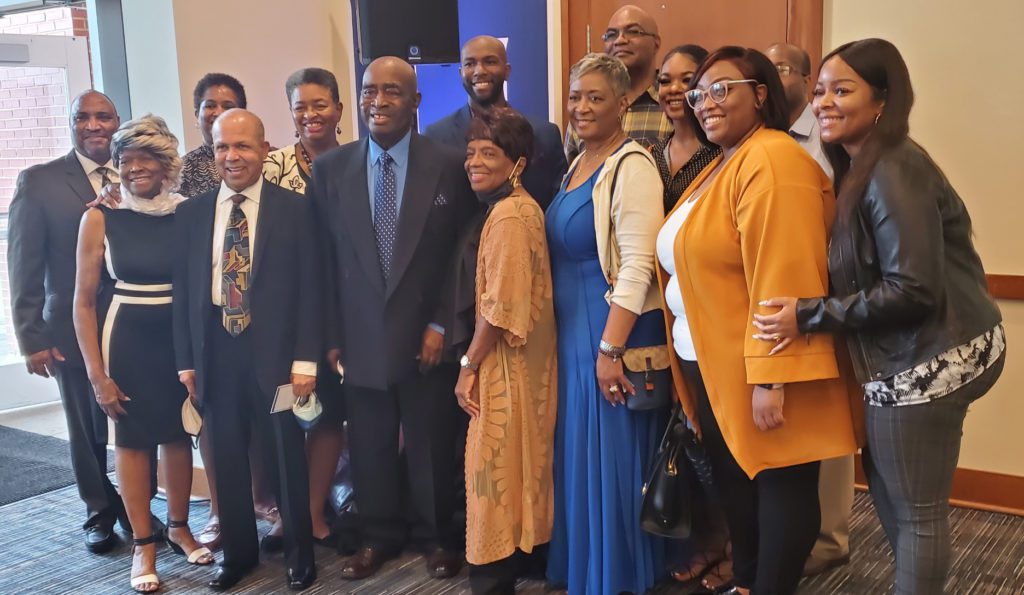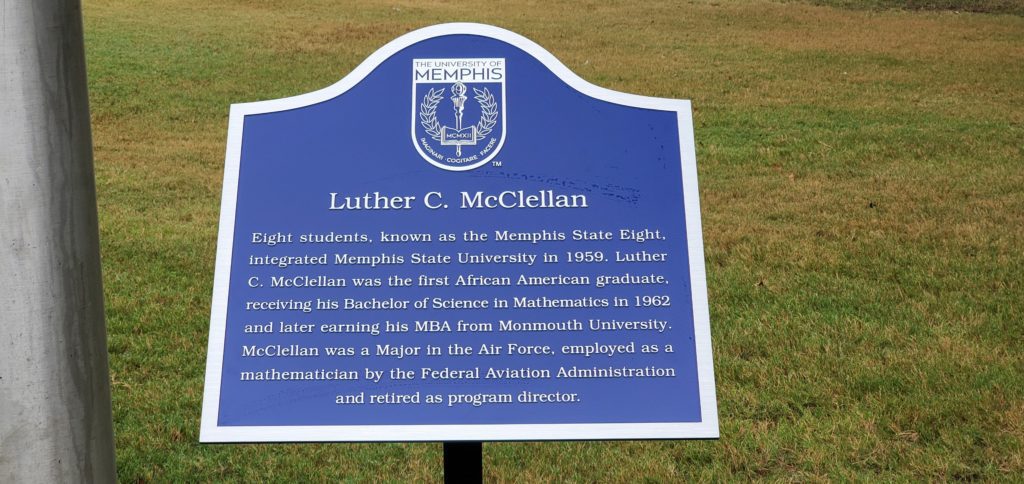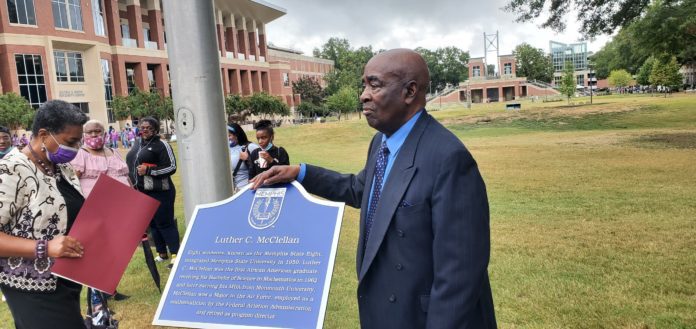In the late 1950s, Memphis State University vigorously resisted racial integration among both its faculty and student body.
Although the Supreme Court had declared that segregated education was unconstitutional in the landmark 1954 Brown v. Board of Education of Topeka ruling, colleges and universities, particularly in the South, routinely rejected students on the basis of race.
Memphis State University was a part of that norm, but reluctantly admitted eight African-American students in 1959. Thrown into a cauldron of racial hatred and open hostility, the courageous young people became known as the “Memphis State Eight.”
On Sept. 17, the now University of Memphis unveiled a marker naming the Alumni Mall after the first African-American graduate Luther C. McClellan.
Long-time friends and former students gathered to celebrate the unveiling of the Luther C. McClellan Alumni Mall.
“I never thought I would see a day when a Black student would be honored on that campus,” McClellan said. “But it is so gratifying to see. It was a very pleasant surprise.”
The dedication was a part of the university’s Eradicating Systemic Racism and Promoting Social Justice Initiative that kicked off in 2020 in the aftermath of the George Floyd video release showing Floyd’s Memorial Day 2020 choking death by Minneapolis police officer Derek Chauvin and the resulting worldwide protests.
Chauvin, 45, was convicted on charges of second-degree unintentional murder, third-degree murder and second-degree manslaughter for his role in Floyd’s death. He was sentenced to 22½ years in prison in June.
Three other officers, who were on the scene when Floyd was killed, are awaiting trial on related charges.
“It is quite an honor to receive this recognition,” McClellan said. “I applaud the University of Memphis for all of its efforts to make sure we are integrated, diverse and that all students get a fair opportunity to succeed. I am so proud to be a graduate.”
The university’s African-American enrollment now is about 34 percent.
McClellan came to Memphis State as a sophomore. He had just completed his freshman year at LeMoyne College, now LeMoyne-Owen College.
“No one encouraged me to do it, or told me I should do it,” said McClellan. “I just made up my mind that I was going to attend Memphis State, and my mother was supportive. I was in for a rude awakening.
“That first year was rough. The dean met us that first day and spent all his time telling us what we weren’t allowed to do. We were not made to feel welcome at all.”

Friends, family and supporters of Luther C. McClellan were on hand for the marker dedication, including Memphis State Eight trail blazers Bertha Rogers Looney (front, fourth from right) and Ralph Prater (front, second from left). Marvis Kneeland Jones, the only other surviving member of the Memphis State Eight was unable to attend because of illness. The other Memphis State Eight students were Eleanor Gandy, Sammie Burnett Johnson, Rose Blakney Love and John Simpson. (Photo: Tyrone P. Easley)
McClellan said the eight African-American students were supposed to be off the campus by noon, but he had a chemistry lab two days a week that was scheduled in the afternoon. The student center and cafeteria were off-limits for the eight as well.
“Those restrictions were imposed that first year,” said McClellan. “That next year, many other black students came to the university. We started going where we wanted to go. We would get together to just socialize among ourselves. It was nothing for us to play cards in the student center.”
Associate Dean Linda Hall of Multicultural Affairs said the George Floyd killing and the subsequent movement for social justice around the world created a “reflective moment” for the University of Memphis.
“The whole movement caused individuals to reflect on how they were contributing to that situation personally,” said Hall. “The renaming of campus landmarks to honor the contributions of African Americans is an opportunity for the school to right some wrongs.”
The effort to recognize outstanding contributions by African Americans was driven by “three black females.”
“The president of the Student Government Association, the president of the Black Student Association, and the president of the NAACP all met with President (M. David) Rudd last year because the University of Memphis had no reflection of the diversity of contributions by faculty and students, neither past nor present.
“Fortunately, university officials were open to listening to those concerns.”
Rudd said the school is “making progress” in the effort toward embracing diversity.
“It was an act of remarkable personal courage by Luther and so many others across this country that forced the United States to start facing the issue of racial injustice and equality, said Rudd. “We are certainly nowhere near where we need to be, but we are making progress. …
 “I hope the people who visit this marker on the Luther C. McClellan Alumni Mall recognize and embrace the personal values, qualities and characteristics that fueled Luther’s persistence in the face of unparalleled adversity and great personal risk.”
“I hope the people who visit this marker on the Luther C. McClellan Alumni Mall recognize and embrace the personal values, qualities and characteristics that fueled Luther’s persistence in the face of unparalleled adversity and great personal risk.”
McClellan graduated in 1962 with a B.S. degree in mathematics. McClellan then became an Air Force officer, specializing in radar countermeasures.
He worked as a computer expert at the North American Aerospace Defense Command (NORAD) and as a program director at the Federal Aviation Administration (FAA).
He retired in 1998 with more than 30 years of experience working for the FAA and Air Force. He also retired from the Air Force Reserves as a major.
McClellan also earned an MBA from Monmouth University.
The Black Alumni Chapter of the University of Memphis Alumni Association awards the Luther C. McClellan Scholarship annually to as many as three deserving minority students.
This award recognizes students who “have shown outstanding academic achievement, leadership qualities and community involvement.”
The first event of this kind was in November when a marker was placed outside of Jones Hall to honor the late Dr. Miriam DeCosta Sugarmon-Willis, the university’s first African-American professor. The building was renamed in her honor.




